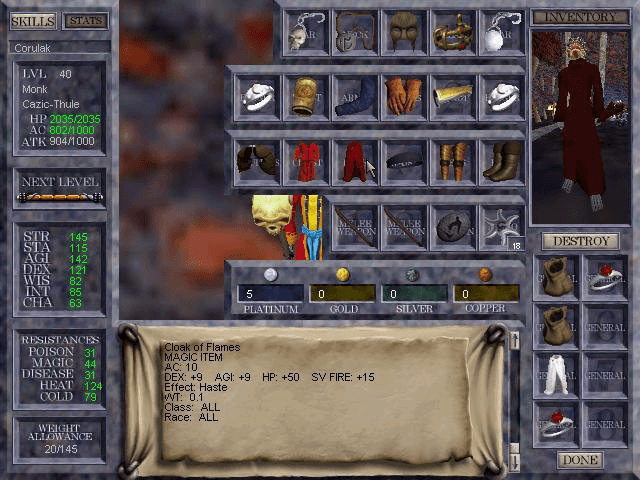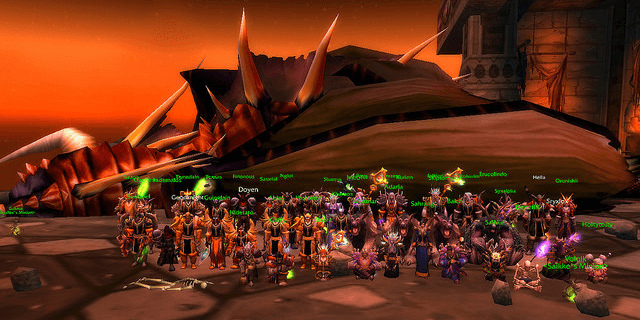"MMORPGs" and "self-improvement" rarely belong in the same sentence, especially when you consider the unfounded stereotype that gamers are lazy, awkward slobs. As a former video game addict myself, I can attest to the life-robbing power of MMORPGs.
But I also believe that MMORPGs can teach us a lot about self-growth, maturity, and personal success. We just have to peel back the surface and delve down if we want to see what these massively multiplayer virtual worlds can show us about the universal human condition.
While I don't play MMORPGs anymore -- regrettably, I don't have that kind of time to spare -- I'm certainly glad that I used to. Here are some of the more important lessons I've learned during those years.
Goals Are the Key to Progress
The gameplay in every single MMORPG is driven by goals. In fact, I'd argue that this is true of every single game in the world. You can't have a game without a goal, which is fitting when you consider that every human always has at least one goal that they wish they could reach.
Some MMORPGs, like World of Warcraft, are about game-defined goals. These are commonly known as "theme park MMOs" because they have specific kinds of content that are designed to be consumed in specific ways. You progress according to the designer's intentions. You "do what you're told" and there's very little freedom.
Other MMORPGs, like EVE Online, are about self-defined goals. The designer doesn't care to lead you by the reins. There's no set progression path that you're supposed to follow. That's why these are commonly known as "sandbox MMOs", because you have the freedom to set your own goals.
Either way, the key is goals. Without goals, you stagnate. You can't progress because you have nowhere to progress towards. In an MMO, the moment you cease having goals is the moment you stop logging on. In life, the lack of a goal will halt all forms of personal growth.
Some goals are handed to you (perhaps by your employer) while other goals are internally generated (such as the desire to get healthy), but they're both important. You just have to make sure that you avoid certain goal-setting mistakes, otherwise your goals may slowly turn into dreams instead.
Productivity Obsession Is Bad For You
A young and overweight internet addict from northern China collapsed and died after spending ... [a] seven-day holiday in front of the computer screen, leaving it only for toilet breaks and to snatch a few hours sleep on the bed next to it.
HT: Telegraph
If there's one thing about MMORPGs, it's that they are extremely addictive. It's easy to lose hours and days in pursuit of one more level, one more quest, or one more raid boss. It's captivating -- even thrilling -- to feel like we're making so much progress.
But it's just as important, if not more important, to remember that progress isn't everything.
Not only am I a former video game addict, I'm also a recovering workaholic. Are the two related? In my case, absolutely. The same drive that kept me playing MMORPGs for hours at a time is the same drive that tempts me to overwork myself.
I crave progress. I crave productivity. I have to forcibly remind myself that neither of these things are good in excess. Self-improvement isn't just about growing; it's about being able to realize when you're trying to grow too fast. When the self-improvement game becomes an obsession, you have to be able to walk away.
True Success Can't Be Rushed
My first real encounter with multiplayer RPGs was a text-based online adventure game called Legends of Terris, which was one of several major precursors to the modern MMORPG genre. From there I progressed to level-centric titles like Ragnarok Online, EverQuest, and World of Warcraft.
In all cases, my primary pursuit was always to reach maximum level as soon as I could. Looking back, I'm not sure why I was so desperate to reach the level cap, but suffice it to say that I wanted it more than anything.
People like me -- those who are so focused on the destination that they gladly ignore the journey -- tend to resort to two objectionable alternatives: powerleveling and character trading.
Powerleveling is when a high-level character aids a low-level character so that they can kill extremely difficult monsters and level up much faster than a character normally could. Character trading, on the other hand, involves spending real cash to purchase another player's character.
Both powerleveling and character trading serve a higher purpose: instant gratification.
The problem with instant gratification is that the player bypasses all of the struggles and difficulties that are inherent in the natural leveling process. When a player skips all of that, you end up with somebody who doesn't know how to play their character or what their abilities do. Not only are they clueless, but nobody around them respects them.
And so it is in real life.
People who constantly seek shortcuts and magic pills are rarely respected; instead, they tend to be ridiculed, scorned, and disregarded. But the real tragedy is that if they manage to find a shortcut that actually works, they miss out on the richness of the journey they just skipped.
Learn from these successful entrepreneurs. There's no honor or character in conflict avoidance. Embrace the struggle and you'll become a better person, regardless of whether you reach the destination you were hoping for.
You Can't Make It On Your Own
Early MMORPGs focused heavily on teamwork and group play. For example, in EverQuest, it was pretty much impossible to progress on your own unless you played as one of the few classes that had some degree of "soloability". But even then, the truly valuable enemies were often difficult enough that they required groups to take down.
Which ultimately means that one person can only do so much. Sure, there may be goals that you can achieve on your own and without any outside help, but if you want to achieve something truly extraordinary, you probably can't do it on your own. If you really want to try it solo, it'll take much longer and require more sweat and tears.
But there's another aspect to this.
An MMORPG is the kind of game that demands social interaction. In every survey that asks "Why do you keep playing MMORPGs?", the most popular response is always "Because my friends play it." Even when everyone is playing a solo character, the individuals are still playing together.
This camaraderie shouldn't be overlooked. The support and enthusiasm of others is a great way to cultivate your own morale, even if those people aren't directly involved in whatever goal you're pursuing. Being a loner is just asking for self-doubt to come in and crush your self-esteem, which is the quickest path to abandoning reason and an objective perspective.
Sunk Cost Is Not a Valid Excuse
Yet while we're on the topic of abandonment, it's important to accept the fact that quitting is sometimes acceptable, perhaps even advisable. Traditional self-improvement advice touts a "quitters never win" kind of mentality, but the reality of success is that winners recognize when quitting is the right move.
Let's say you're playing a game like World of Warcraft and you've reached the level 50 as a Warrior... but you're not having as much fun as you thought you would. You want to quit, but you keep thinking about how much time you've invested in getting to this point. You don't want to throw that all away, so you keep playing that lackluster Warrior.
This is called the sunk cost fallacy:
The idea that a company or organization is more likely to continue with a project if they have already invested a lot of money, time, or effort in it, even when continuing is not the best thing to do.
Sunk costs are resources that have already been invested and can't be recovered. They're gone for good. As such, those resources should have no impact on present decisions. If you're going to make further investments, they should be based on whether or not you expect to make a return on those investments, not based on how much you've already invested.
So, if playing a Warrior provides no entertainment value to you, then it doesn't matter how much time you've wasted getting to level 50. The right decision is to start over as a new character, one that might provide more entertainment value.
And in life, if you've been pursuing a goal for the past decade and you're realizing that you don't want to pursue that goal anymore, it's okay to stop. Those ten years are already gone. Don't use that as an excuse to waste another ten years.
What Video Games Can Teach Us
MMORPGs aren't the only games that can benefit us. For instance, we can learn about self-improvement from Super Mario. Games can teach us important life lessons, and if approached in the right way, video games can make you a better person.
As it turns out, maybe video games aren't entirely so bad after all.
Have you ever had any epiphanies from gaming? Can you attribute any of your personal growth to video games? Or do you think video games are a waste of time? Share your thoughts with us in the comments!
Image Credits: playing video game Via Shutterstock, WoW Raid Via Jovial Joystick



